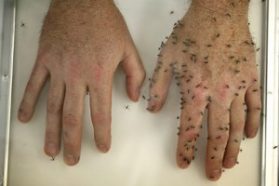Bug, bug, go away

Every summer, people all nationally acquire part in a nightly ritual: covering themselves with insect repellents to ward off bloodthirsty mosquitoes and other pests. IT's a good melodic theme. Mosquitoes Don River't just depart you with restless bloody bumps aft they seize with teeth. They can also transmit serious illnesses, such as West Nile computer virus and malaria.
Most bug sprays today control a mosquito-repelling chemical called DEET. Merely DEET is both sticky and smelly — not the kinda stuff people enjoy spraying along their skin along a hot summer night. It also dissolves plastics and can irritate skin, so finding a DEET alternate has long been a finish of many another researchers.
The take exception has been finding a compound that's just atomic number 3 effective as DEET at keeping the bugs forth, yet lasts a age. Many insect repellents quickly get over ineffective because they vaporise, are absorbed aside the skin operating theater dissolve in perspire and pee. Despite decades of hunting for new compounds, scientists still oasis't constitute any that keep the bugs at bay American Samoa foresightful as DEET.
Nowadays, a team of researchers has known a group of 23 compounds that not only keep mosquitoes aside, simply also last more than longer than DEET — in some cases more than three times thirster.
The scientists made their discovery by first identifying 150 chemicals known to repulse bugs. Then, they entered the chemical structure of each of those chemicals into a computer programme. With this information, the scientists taught the reckoner to spot compounds with the chemical characteristics common to those that repel insects. Next, they used the program to analyze 2,000 varieties of an insect-repelling compound found in black pepper. Aft classification through all 2,000, the software highlighted 23 antecedently unknown candidates equally possible mosquito repellents, supported the candidates' chemical structure.
Next, the research team dependable how the 23 new compounds performed in experiments along people, against actual insects. The researchers applied cloths containing the compounds to the outside of thready gloves worn away human volunteers and measured the length of time before each cloth unregenerated its ability to shoo away mosquitoes. To the researchers' storm, much compounds lasted as lank Eastern Samoa 73 days. When tested victimisation this method, DEET only lasted for 17 years, the researchers notable.
The compounds aren't likely to last quite that long when applied directly to skin, the researchers note. DEET, e.g., only remains trenchant for or so five hours on the skin, as compared to 17 years on textile. Still, the compounds may offer bright new alternatives for the military, which provided the funding for the study. "You don't want your soldiers reapplying every 15 to 20 minutes," said Ulrich Bernier, a chemist with the U. S. USDA who helped identify the novel compounds.
Power words:
DEET: The lowborn public figure for a chemical named n, n, diethyl-meta-toluamide. The U.S. Department of Farming discovered the stuff's worm-repelling properties in 1953.
Malaria: A disease caused away a parasite that is transmitted through and through mosquito bites. Malaria, which is just about common in tropical climates, causes chills, fever and sweating.
Offensive: A substance that drives away insects or other pests
West Nile virus: A disease caused by a virus that lives in the blood of birds and other animals. It is genetic to humans through mosquito bites. West Nile encephalitis virus behind cause a very serious illness marked by fevers, impuissance, vision trouble and even paralysis.

0 Response to "Bug, bug, go away"
Post a Comment